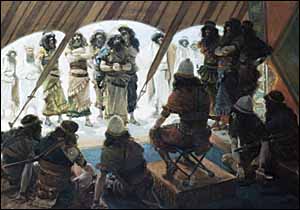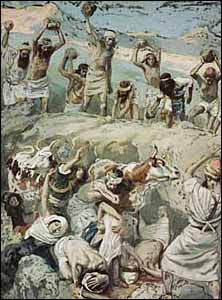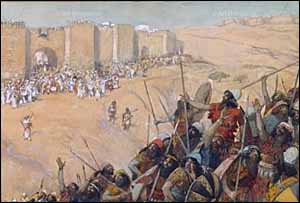Free E-Mail
Bible Studies
Beginning the Journey (for new Christians). en Español
Old Testament
Abraham
Jacob
Moses
Joshua
Gideon
David, Life of
Elijah
Psalms
Solomon
Songs of Ascent (Ps 120-135)
Isaiah
Advent/Messianic Scriptures
Daniel
Rebuild & Renew: Post-Exilic Books
Gospels
Christmas Incarnation
(Mt, Lk)
Sermon on the Mount
(Mt 5-7)
Mark
Luke's
Gospel
John's Gospel
7 Last Words of Christ
Parables
Jesus and the Kingdom
Resurrection
Apostle Peter
Acts
The Early Church
(Acts 1-12)
Apostle Paul
(Acts 12-28)
Paul's Epistles
Christ Powered Life (Rom 5-8)
1 Corinthians
2 Corinthians
Galatians
Ephesians
Vision for Church
(Eph)
Philippians
Colossians,
Philemon
1
& 2 Thessalonians
1 & 2 Timothy,
Titus
General Epistles
Hebrews
James
1 Peter
2 Peter, Jude
1, 2, and 3 John
Revelation
Revelation
Conquering Lamb of Revelation
Topical
Glorious Kingdom, The
Grace
Great Prayers
Holy Spirit, Disciple's Guide
Humility
Lamb of God
Listening for God's Voice
Lord's Supper
Names of God
Names of Jesus
Christian Art
About Us
Speaking
Contact Us
Dr. Wilson's Books
Donations
Watercolors
Sitemap
 James J. Tissot, 'Achan and Joshua' (1896-1902), gouache on board. The Jewish Museum, New York. |
By all accounts, the Battle for Jericho seems to have gone exceedingly well. The walls fall. The troops rush in. Rahab is saved. All is well except for the sin of a single man, Achan.[25] And his sin affects the whole nation.
Achan Takes Plunder (7:1)
Achan, one of the Israelite soldiers, takes some plunder -- a beautiful imported robe for his wife, 5 pounds (2-1/4 kg) of silver, and a wedge of gold weighing about 1-1/4 pounds (0.6 kg). The value of the silver and gold in today's currency is probably about USD $25,000 (7:21).[26] In other words, compared to the standard of living in those days, this man stole and hid a fortune in Yahweh's possessions! It was a costly disobedience. The narrator records:
"But the Israelites acted unfaithfully in regard to the devoted things; Achan son of Carmi, the son of Zimri, the son of Zerah, of the tribe of Judah, took some of them. So the LORD's anger burned against Israel." (7:1)
Yahweh, the One who wins battles for Israel is now angry with Israel for disobedience. As we'll see, in the next battle for the city of Ai (pronounced "eye"), the Lord doesn't fight. That gets the nation's attention.
Devoted Things (6:17a, 18, 19)
But we're getting ahead of ourselves. In Lesson 4 we studied the concept of ḥērem, "devoted" (related to our word "harem"), the property of Yahweh that must not be touched by an individual. Joshua's instructions to the army were quite clear on this point:
"The city and all that is in it are to be devoted (ḥērem) to the LORD.... But keep away from the devoted things (ḥāram), so that you will not bring about your own destruction by taking any of them. Otherwise you will make the camp of Israel liable to destruction (ḥērem) and bring trouble on it. All the silver and gold and the articles of bronze and iron are sacred to the LORD and must go into his treasury." (6:17a, 18, 19)
The city belonged to the Lord; the soldiers were prohibited from taking plunder, the usual way soldiers were paid. The Hebrew is interesting. It implies, keep away from the things devoted to destruction, or you yourself will be destroyed.
The Sin of One
 The first verse of our passage is troubling:
The first verse of our passage is troubling:
"So the LORD'S anger burned against Israel" (7:1b)..
Why should God blame the whole nation -- "Israel has sinned" (7:11a) -- for the sin of a single man? If tens of thousands of troops were involved in the conquest of Jericho, you might reason, you can't expect perfection. One of them, at least, will disobey orders. Why should the whole nation suffer for the greed of one?
Why indeed? But in a time of war, you must agree, one soldier who fires prematurely can alert the enemy and destroy the whole army. One person who shares a secret can expose an entire nation to defeat. Real life demonstrates that all can suffer for the sins of a single person.
We observe in this passage a sense of solidarity or unity or oneness that Achan has with the whole people. This concept might not be foreign to a citizen of Japan who has the importance of the group instilled in him from early childhood. But to Americans, perhaps the most individualistic people on earth, it's hard to fathom. "Every man for himself" is much more familiar to us than "the good of the many."
Notice that though only one person stole the Yahweh's plunder, the whole nation was guilty of the sin until it was dealt with, no matter that no one knew.[27] A sin had occurred that upset the relationship of Yahweh with Israel.
The Sins of the Fathers
In our text, God holds a whole nation responsible for the sins of an individual. Along the same lines, I believe that churches can be hindered by the sins of members, even members in the of the church's past. To be free to receive God's grace, those sins need to be discerned, confessed, and repented of by the body. If you've read recent literature in the field of intercession and deliverance, then you know something about breaking hereditary bondages and praying prayers of confession on behalf of a whole nation (Daniel 9:4-19; 2 Chronicles 7:14).[28]
We see a similar sense of solidarity with others in the New Testament -- with the body of Christ (1 Corinthians 12:18-20) and with one's spouse (Ephesians 5:28-32). One person's sin can affect a congregation (1 Corinthians 5; Revelation 2:12-29). Paul advises Timothy, "Do not be hasty in the laying on of hands, and do not share in the sins of others. Keep yourself pure" (1 Timothy 5:22).
For example, Popes John Paul II and Pope Francis have publically confessed and asked for forgiveness on behalf of the Roman Catholic Church for sins committed in persecuting Protestants,[29] for the split between the Catholic and Orthodox branches of the Church, and for sexual abuse by priests, among other things.
Years ago, I was pastor of a small church that underwent a nasty split. God spoke to me clearly that when all this was over, I was to lead the remaining flock in a time of fasting and prayer for repentance, to free them from the guilt of sins they had committed during this time so that the church might prosper going forward. God has since blessed that body.
Q1. (Joshua 7) How can the sin of one person affect a
country? A congregation? How does your congregation deal with sin that affects
the body? How can we take sin seriously without developing a judgmental,
legalistic spirit in our churches? What is the importance of confessing sins on
behalf a congregation, a denomination, or a nation?
https://www.joyfulheart.com/forums/topic/1660-q1-sins-effects/
Defeat at Ai (7:2-5)
Joshua doesn't know about the sin -- yet. He sends spies to assess the force needed to subdue Ai, the next city he must conquer. His advisors tell him that only two or three thousand troops are needed. So -- without consulting the Lord -- Joshua sends three thousand men,
"... But they were routed by the men of Ai, who killed about thirty-six of them. They chased the Israelites from the city gate as far as the stone quarries and struck them down on the slopes. At this the hearts of the people melted and became like water." (7:4b-5)
Suddenly, the high moral that followed the fall of Jericho turns to fear. As Joshua says in his prayer:
"The Canaanites and the other people of the country will hear about this and they will surround us and wipe out our name from the earth. What then will you do for your own great name?" (7:9)
The consequence will be the destruction of Israel and dishonor to the name of Yahweh.
Identifying the Sinner (7:10-19)
God now tells Joshua that an Israelite has broken the covenant by taking devoted things.
"I will not be with you anymore unless you destroy whatever among you is devoted to destruction.... That which is devoted is among you, O Israel. You cannot stand against your enemies until you remove it." (7:12, 13b)
 James J. Tissot, 'Achan and His Family Stoned to Death' (1896-1902), gouache on board, The Jewish Museum, New York. |
Yahweh tells Joshua to consecrate the people in preparation (which we saw in Lesson 3). Then the next day the sinner will be identified.
Tribe by tribe, then clan by clan, and finally family by family, it seems that they cast lots to see where the guilt lies. The guilty party is apparently found out by means of the Urim and Thummim, in some kind of sacred casting of lots to determine God's will. I'm just speculating here, but if you have a pair of two-sided lots, each with a "Yes" on one side and "No" on the other, you can get three answers when casting both: "Yes" (two yeses) , "No" (two noes)., and "No answer" (one yes, one no).[30]
Finally, it comes down to Achan, who confesses:
"I have sinned against the LORD, the God of Israel. This is what I have done: When I saw in the plunder a beautiful robe from Babylonia, two hundred shekels of silver and a wedge of gold weighing fifty shekels, I coveted them and took them. They are hidden in the ground inside my tent, with the silver underneath." (7:20b-21)
Achan's greed has taken a terrible toll on the whole nation! The plunder is found and spread before the Lord. Then it is taken with Achan ("trouble") and all his family to the Valley of Achor ("trouble"), where they are stoned to death, then burned, and finally covered with a pile of rocks.
Taking Sin Too Lightly
Achan's punishment is terrible! Not unjust, but full of terror for sinners. So often, we minimize and rationalize our own sins. I've sometimes wondered how God could have used me if I had repented of some sins earlier. How would I be different? If only ... if only.
Sin dulls our spiritual edge. It keeps us from wanting to listen keenly and carefully. It loads us with guilt that is the enemy of bold faith. Sin is like hobbles on our legs so we cannot run when we need to. One of the lessons of Achan's sin is that we must take sin and disobedience very seriously if we desire God's favor and blessing.
The world longs to see sin-free Christians. Oh, it complains of "holier than thou" when it sees our self-righteousness. But if it could just see humble, Christ-loving people who have repented from their sin and now struggle to live free. What power there is in that! No, none of us is perfect in this life, and we must all confess our sins (1 John 1:9). But God intends us to live free. We must not settle for so much bondage and call it "normal" Christianity!
This passage indicates that sin affects not only us, but also the people around us.
The Sin of Greed (Malachi 3:8-9; Luke 12:15)
In particular, Achan commits the sins of greed and theft. He sees something of great value that belongs to another and takes it. What does Yahweh need this for anyway? He has more than he needs, while I don't. Achan covets what belongs to God, keeps it for himself, and buries in the floor of his tent.
There is a parallel with a passage in Malachi 3, where Yahweh says to God's suffering people:
"Will anyone rob God? Yet you are robbing me! But you say, 'How are we robbing you?' In your tithes and offerings! You are cursed with a curse, for you are robbing me -- the whole nation of you!" (Malachi 3:8-9)
This is not the place to debate whether we New Testament saints "owe" God the tithe, and thus to withhold it puts us in Achan's shoes. Nevertheless, we must admit that greed has a lot to do with our giving.
Once while Jesus was teaching, a man called out, "Make my brother give me my share of the property." Jesus took this as an occasion for public warning:
"Watch out! Be on your guard against all kinds of greed; a man's life does not consist in the abundance of his possessions." (Luke 12:15)
The man thought he was asking for justice, but Jesus saw the real motivation -- greed -- and called it what it was. Lord, free us from the sin of greed when we cling to that which belongs to you and you only.
Q2. (Joshua 7:20-21; Malachi 3:8-9; Luke 12:15) How is it
possible for both rich and poor to suffer from greed? How can our greed affect
our giving to the church? To what degree do you believe Americans are captives
of greed? How do we repent and free ourselves from greed?
https://www.joyfulheart.com/forums/topic/1661-q2-greed/
The Destruction of Ai (8:1-28)
 James J. Tissot, 'Ai Is Taken by Joshua' (1896-1902), gouache on board, The Jewish Museum, New York. |
Now Joshua seeks the Lord about how to take Ai, and the Lord speaks to him about strategy. So Joshua hides 30,000 elite troops out of sight behind Ai. Another 5,000 troops are hidden elsewhere. Then he has his main force feign retreat from Ai's troops. Ai's troops chase them and leave the fortified city open and unguarded. When Joshua lifts his javelin as a sign, the 30,000 troops rush in, take the city, and set it on fire. The 5,000 attack the soldiers from Ai from behind. They are trapped between Israelite forces and destroyed. This time, however, the Israelites are permitted to plunder the city and its livestock.
The Covenant Renewed (8:29-35)
Now Joshua holds a solemn, formal renewal of the covenant. He builds an altar, makes sacrifices, and reads the Law to all Israel gathered at Mount Ebal and Mount Gerizim.
Gibeonite Deception (9:1-15)
When the inhabitants of Canaan see the Israelites win victory after victory, they are terrified. Some form a military alliance to attack the Israelites with combined armies (Lesson 6), but the citizens of Gibeon use a different strategy to survive -- deception.
The Gibeonites take elaborate measures to appear as if they are on a long journey far from their homes, down to the details of moldy bread and cracked wineskins, tattered clothes, and worn-out sandals. Hollywood couldn't have done better. The Gibeonites lie about their identity and request a treaty or covenant of peace. The Israelites are utterly fooled and fail to consult the Lord (9:14b). So Joshua and his leaders make a peace covenant, ratified by an oath in the name of the Yahweh.
Sanctity of the LORD'S Name (9:16-27)
Three days later the Israelites discover their error, but it is too late.
"We have given them our oath by the LORD, the God of Israel, and we cannot touch them now. This is what we will do to them: We will let them live, so that wrath will not fall on us for breaking the oath we swore to them." (9:19-20)
If we were there, we'd probably go to court to have the agreement annulled on the grounds that it was entered into fraudulently. But the Israelites honored the LORD's name, even over being cheated.
Suzerain-vassal treaties, covenants between a greater and lesser power, were ratified by an oath in the name of the nation's god. When Israel's leaders swear in the name of the Yahweh, they cannot go back on it.
They take seriously the Ten Commandments, number three of which is:
"You shall not take the name of the LORD your God in vain." (Exodus 20:7, ESV)
"In vain" (ESV, KJV), "make wrongful use of" (NRSV), "misuse" (NIV) is shāwʾ, "emptiness, vanity, falsehood.... It designates anything that is unsubstantial, unreal, worthless, either materially or morally."[31] This commandment means that if they swear by the LORD they cannot break their oath, for if they do so, they are guilty before the LORD himself.
The Israelites feel that swearing in the LORD's name is so binding on them that it prevents them from fulfilling the LORD's command to destroy the Gibeonites as they did the other peoples of the land. And when the Gibeonites themselves are attacked by a coalition of five Amorite kings, Israel, as the protector in the treaty, is obligated to come to their rescue (Lesson 6).
Compared to the high honor in which the Israelites held God's name, we regard it little. We take it lightly on our lips in order to sound pious. We hear his name uttered as a swearword so often that we are conditioned to ignore this blasphemy. The story of the Gibeonite deception teaches us how seriously we ought to take his name.
By Jesus' day, however, the matter of taking oaths had become a devious art, with oaths being more or less binding depending upon which holy thing they were sworn upon. Jesus taught his disciples, s,
"I tell you, Do not swear at all.... Simply let your 'Yes' be 'Yes,' and your 'No,' 'No'; anything beyond this comes from the evil one." (Matthew 5:34, 37; cf. James 5:12).
Rather, Jesus taught his followers about the power of the Name, of praying in his Name to the Father, of casting out demons in his Name, of healing in his Name. May the Lord curb our tongues, so that when we utter his Name, we do so with meaning and gravity and power.
Q3. (Joshua 9:16-27; Exodus 20:7; Matthew 5:34, 37; James
5:12) What does it mean to "take the Lord's name in vain"? How are we tempted to
do that? Why do we tend to take our promises so lightly? How does this reflect
on God's character?
https://www.joyfulheart.com/forums/topic/1662-q3-misusing-gods-name/
Inquiring of the Lord(9:14)
We can't leave this lesson without observing Israel's failure to consult God before acting -- twice -- a serious leadership flaw that we so easily fall into in the twenty-first century.
"The men of Israel sampled their provisions but did not inquire of the LORD." (9:14)
We see the same error in 7:1-5 where Joshua sends 3,000 men to take the city of Ai only to suffer a humiliating defeat. It appears that Joshua is in the habit of making important leadership decisions without consulting with the Lord. Oh, he consults with other trusted military and tribal leaders (the ancient equivalent of the church board). But he forgets to consult with the Lord himself, and gets the whole nation into trouble.
It may seem a bit pious when we answer someone, "Let me pray about it, and I'll let you know later," but this is the path of wisdom. There's truth in that old hymn,
"Oh, what peace we often forfeit,
Oh what needless pain we bear,
All because we do not carry
Everything to God in prayer."[32]
This is another reminder that "the battle is the Lord's." God will not fight our battles unless we consult him and then are obedient to do what he directs. It was that way 3,500 years ago, and it is that way today.
The secret to Jesus' success was his constant communication with the Father. He explained to his disciples:
"I tell you the truth, the Son can do nothing by himself; he can do only what he sees his Father doing, because whatever the Father does the Son also does." (John 5:19)
Jesus wasn't so interested in the adulation of the crowds, as in spending time with his Father. He would rise early in the morning to pray and consult. When he selected the 12 Apostles, he spent all night in prayer. He is our Model and Mentor in life and ministry. He is our Leader, and we are to do likewise.
It's difficult in the scope of this lesson to teach about seeking guidance from God. However, it's important to get it into balance in our lives. We shouldn't be asking God if it's okay to brush our teeth, or to help a child who is injured. We should act as we have been trained. But when it comes to important decisions, even routine decisions that we must get right, we must learn to seek God's guidance routinely before going forward.
Q4. (Joshua 9:14; 7:1-5) How did Joshua's failure to
consult God before making decisions hurt Israel? How did Jesus model close
communication with God before making major decisions? What does it take for us
to hear God's voice or to get confirmation from God for a course of action?
https://www.joyfulheart.com/forums/topic/1663-q4-consulting-god/
When I think about these three chapters, I find them vaguely depressing. Where's the unbroken string of victories that ought to follow a godly leader? But the book of Joshua is a slice of real life. The truth is that we often learn more from our failures than from our successes. It appears that Joshua did learn from his failures, for after the deception of the Gibeonites, we see him moving from victory to victory.
Lessons for Disciples

Lessons in book formats are available. |
The incident of the Gibeonite deception opens a number of lessons to attentive disciples.
- The sin of one in a family or a congregation can profoundly affect God's blessings on the body.
- Sin is not always immediately apparent, though it can still affect God's blessing on our lives.
- Both rich and poor are susceptible to the sin of greed. To be effective disciples of Christ, we must discern greed in our lives and refuse to let it control us (Joshua 7:20-21; Malachi 3:8-9; Luke 12:15).
- We must fulfill what we have solemnly promised before the Lord (Joshua 9:16-27; Exodus 20:7; Matthew 5:34, 37; James 5:12).
- When we fail to consult the Lord about important decisions of our lives, we can frustrate God's best for us. Seeking and listening must be the foundation of our discipleship.
Prayer
Our Father, we have often made these same errors. Our sins have hurt others in our church and family. We have taken major steps in our lives without consulting you. We have made rash promises we shouldn't keep. And we have too often spoken your name so casually. Please forgive us, Lord. Cleanse us from our sins through the sacrifice of Jesus on the cross. And teach us how to follow you. In Jesus' name, we pray. Amen.
Key Verses
"The Israelites acted unfaithfully in regard to the devoted things; Achan son of Carmi, the son of Zimri, the son of Zerah, of the tribe of Judah, took some of them. So the LORD's anger burned against Israel." (Joshua 7:1, NIV)
"I have sinned against the LORD, the God of Israel. This is what I have done: When I saw in the plunder a beautiful robe from Babylonia, two hundred shekels of silver and a wedge of gold weighing fifty shekels, I coveted them and took them." (7:20b-21a)
"The men of Israel sampled their provisions but did not inquire of the LORD." (Joshua 9:14, NIV)
Endnotes
[25] Achan's name comes from an unused Hebrew root ʿāḵan that denotes trouble of the most serious kind -- Jacob's blood feud with Canaanite neighbors (Genesis 34:30), Jephthah's foolish vow (Judges 11:35), etc. In Proverbs the word is used to describe the results of cruelty, disloyalty, greed, wickedness (ISBE 1:31).
[26] The weight of a shekel is about 0.4 ounce or 11.4 grams (E.M. Cook, "Weights and Measures," ISBE 4:10. In May 2017, the price of silver is about USD $200 per pound or a total of about USD $1,000. The price of gold is about $16,000 per pound, for a total of about USD $25,000.
[27] The concept of corporate sin and corporate atonement is present in the New Testament when Paul talks about sin coming through one man Adam and grace coming through one man Jesus Christ (Romans 5:12-19), and Christ the Second Adam (1 Corinthians 15:45-49).
[28] For more on this see C. Peter Wagner's books on intercession, as well as literature from the deliverance movement.
[29] John Paul II, New York Times, March 12, 2000. "As bishop of Rome and pastor of the Catholic Church, I want to beg for mercy and forgiveness for un-Gospel-like behavior on the part of Catholics against Christians of other churches" (Catholic News Service, January 26, 2016).
[30] For more on this, see my article "Inquiring of the Lord" (www.joyfulheart.com/scholar/inquire.htm).
[31] Victor P. Hamilton, shāwʾ, TWOT #2338a.
[32] Joseph M. Scriven, "What a Friend We Have in Jesus" (1855). Music by Charles C. Converse.
Copyright © 2025, Ralph F. Wilson. <pastor![]() joyfulheart.com> All rights reserved. A single copy of this article is free. Do not put this on a website. See legal, copyright, and reprint information.
joyfulheart.com> All rights reserved. A single copy of this article is free. Do not put this on a website. See legal, copyright, and reprint information.
 |

|
In-depth Bible study books
You can purchase one of Dr. Wilson's complete Bible studies in PDF, Kindle, or paperback format -- currently 48 books in the JesusWalk Bible Study Series.
Old Testament
- Abraham, Faith of
- Jacob, Life of
- Moses the Reluctant Leader
- Joshua
- Gideon
- David, Life of
- Elijah
- Psalms
- Solomon
- Songs of Ascent (Psalms 120-134)
- Isaiah
- 28 Advent Scriptures (Messianic)
- Daniel
- Rebuild & Renew: Post-Exilic Books
Gospels
- Christmas Incarnation (Mt, Lk)
- Sermon on the Mount (Mt 5-7)
- Luke's Gospel
- John's Gospel
- Seven Last Words of Christ
- Parables
- Jesus and the Kingdom of God
- Resurrection and Easter Faith
- Apostle Peter
Acts
Pauline Epistles
- Romans 5-8 (Christ-Powered Life)
- 1 Corinthians
- 2 Corinthians
- Galatians
- Ephesians
- Philippians
- Colossians, Philemon
- 1 & 2 Thessalonians
- 1 &2 Timothy, Titus
General Epistles
Revelation
Topical

 To be notified about future articles, stories, and Bible studies, why don't you subscribe to our free newsletter, The Joyful Heart, by placing your e-mail address in the box below. We respect your
To be notified about future articles, stories, and Bible studies, why don't you subscribe to our free newsletter, The Joyful Heart, by placing your e-mail address in the box below. We respect your